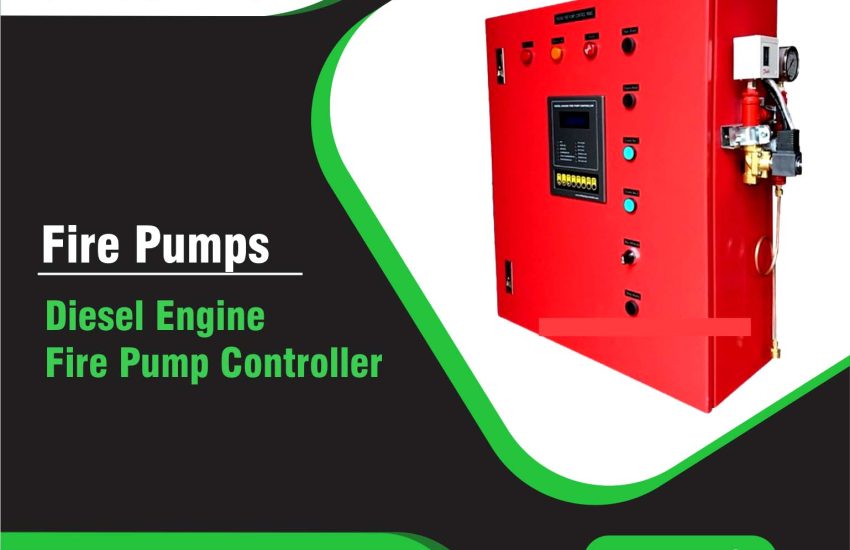Diesel Engine Fire Pump Controller is essential in fire protection systems. It ensures the fire pump, powered by a diesel engine, operates reliably during emergencies. This controller activates the pump when needed, maintaining water flow for fire suppression. Diesel-powered fire pumps are particularly valuable in locations where electrical power may be unreliable.
Let’s explore the key specifications, features, and benefits of Diesel Engine Fire Pump Controllers.
Key Specifications of Diesel Engine Fire Pump Controllers
1. Power Supply and Voltage Ratings
Diesel Engine Fire Pump Controllers operate with standard AC voltages, including 208V, 480V, and 600V. These controllers are designed to handle three-phase power, making them compatible with most diesel engine fire pumps. This reliable power source ensures the controller activates the pump quickly when needed.
2. Enclosure and Protection
The controllers are housed in durable NEMA enclosures, providing protection against moisture, dust, and corrosion. Depending on the application, they come in NEMA 1, NEMA 3R, NEMA 4X, or NEMA 12 enclosures. This protection ensures the controller stays functional in harsh conditions.
3. Automatic and Manual Operation
Diesel Engine Fire Pump Controllers offer both automatic and manual operation modes. In automatic mode, the controller detects a fire or pressure drop and activates the pump. Manual operation allows for testing and maintenance without triggering the pump, giving operators flexibility and control.
4. Engine Start and Stop Features
The controller automatically starts the diesel engine when the system detects a fire or pressure loss. Additionally, it stops the engine once the emergency is resolved. This functionality ensures the fire pump operates only when necessary, optimizing energy use.
5. Over current and Short-Circuit Protection
To safeguard the system, Diesel Engine Fire Pump Controllers include over current protection. This feature prevents electrical overloads that could damage the system. They also include short-circuit protection to ensure safe operation during electrical faults.
6. Under voltage Protection
The controller also has under voltage protection. It ensures that the diesel engine only starts when the voltage is within safe limits. If the voltage is too low, the system prevents the pump from starting, reducing the risk of damage.
7. Battery Backup
The battery backup feature ensures the controller continues to function during power outages. This backup power allows the system to perform essential tasks like starting the engine and monitoring the system, even when external power is unavailable.
8. Alarms and Monitoring
Diesel Engine Fire Pump Controllers come with built-in status indicators and alarms. These features alert operators to potential issues, such as engine failure, low fuel, or battery power. Remote monitoring capabilities ensure continuous supervision of the fire pump system, even from a distance.
Features and Benefits of Diesel Engine Fire Pump Controllers
1. Reliable Performance in Emergencies
The Diesel Engine Fire Pump Controller ensures reliable performance during fire emergencies. It starts the diesel engine quickly when needed, ensuring the pump delivers water to suppress the fire. This timely response is crucial for protecting life and property.
2. Durability and Longevity
These controllers are built to last, using high-quality materials. Their corrosion-resistant enclosures protect against harsh weather, and they can withstand extreme temperatures. This durability makes them ideal for demanding environments.
3. Cost-Effective Solution
In locations with unreliable electrical power, diesel-powered fire pumps offer a cost-effective solution. Diesel fuel is widely available, and the system doesn’t rely on electricity. As a result, the controller can operate during power outages, ensuring fire protection when it’s most needed.
4. Flexible Installation Options
Diesel Engine Fire Pump Controllers are versatile and can be installed in a wide range of applications. They can be customized to meet specific requirements, whether for commercial buildings, industrial plants, or residential complexes. This flexibility makes them suitable for various fire protection systems.
5. Enhanced Safety Features
These controllers include several safety features to protect both the system and the people using it. For example, they have engine protection mechanisms that prevent damage during operation. Additionally, pressure monitoring ensures the pump functions correctly, further improving the system’s safety.
6. Ease of Maintenance and Diagnostics
These controllers are designed for easy maintenance. With user-friendly interfaces and diagnostic tools, operators can quickly identify and fix issues. Regular checks and testing ensure the system remains operational, even after extended periods of inactivity.
Applications of Diesel Engine Fire Pump Controllers
Diesel Engine Fire Pump Controllers are used in various industries, including:
- Industrial Facilities: Large factories and plants rely on these controllers for reliable fire protection in critical areas.
- Commercial Buildings: Office buildings, malls, and hotels use diesel-powered fire pumps to ensure safety during emergencies.
- Residential Complexes: Multi-story buildings and large residential complexes also benefit from diesel engine fire pumps, especially in areas with unreliable electricity.
- Power Plants and Water Treatment Facilities: These controllers are vital in infrastructure projects where a consistent and reliable water supply is necessary for fire suppression.
Conclusion
A Diesel Engine Fire Pump Controller is an essential part of modern fire protection systems. It provides reliable, cost-effective, and efficient operation during fire emergencies. Key features like automatic engine start, over current protection, and battery backup ensure that fire pumps work effectively when needed. Whether for industrial, commercial, or residential buildings, these controllers offer peace of mind, knowing your fire protection system will perform during an emergency.


